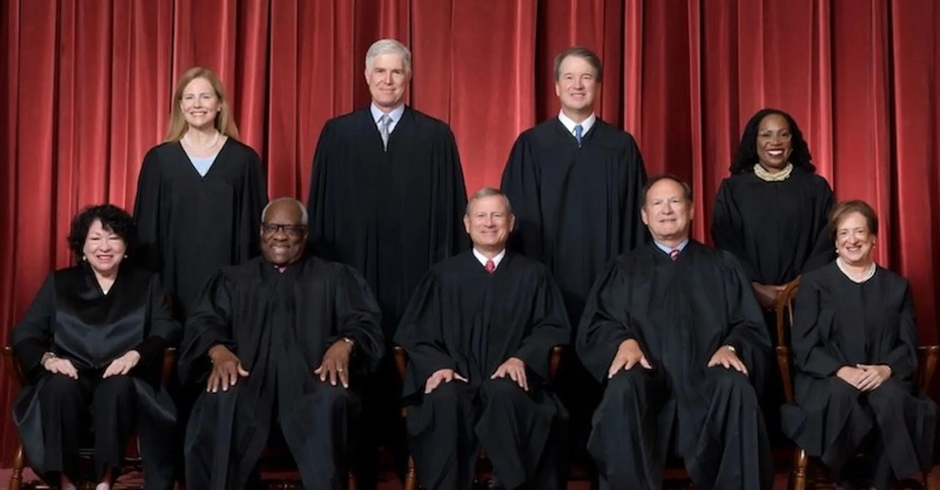Supreme Court Rules Biden Student Loan Forgiveness Program Exceeds Constitutional Constraints
After a legal debate about standing in the case of Biden v Nebraska, the Supreme Court took up the issue of whether the President could unilaterally forgive student debt without an act of Congress. In a 6-3 ruling {pdf here}, the court determined the executive authority of the Dept of Education did not permit such action.
Joe Biden campaigned in 2020 on a promise to eliminate student debt unilaterally, without congressional approval. The court opinion released today affirms that Congress must be involved in their role as decision-makers of federal spending. Justice John Roberts wrote the majority opinion.
[SCOTUS BLOG] – […] When the Biden administration announced the program in August 2022, student-loan repayments had already been on hold for over two years. Betsy DeVos, who served as the secretary of education during the Trump administration, suspended both repayments and the accrual of interest on federal student loans at the start of the COVID-19 pandemic. She relied on the HEROES Act, a law passed in the wake of the Sept. 11 attacks that gives the secretary of education the power to respond to a national emergency by “waiv[ing] or modify[ing] any statutory or regulatory provision” governing the student-loan programs so that borrowers are not worse off financially because of the emergency.
[…] The HEROES Act, Roberts emphasized, gives the secretary of education the power to “waive or modify” laws and regulations governing the student-loan programs. Congress’s use of the word “modify” means that the Biden administration can make “modest adjustments and additions to existing provisions,” Roberts wrote, “not transform them.” But the debt-relief program, Roberts stressed, instead “created a novel and fundamentally different loan forgiveness program.” The plan “modifies” student-loan laws and regulations, Roberts suggested, “only in the same sense that the French Revolution ‘modified’ the status of the French nobility — it has abolished them and supplanted them with a new regime entirely.”
Roberts rejected the Biden administration’s contention that the secretary of education also has the power to “waive” laws and regulations relating to the student-loan program. When the secretary has invoked this power in the past, Roberts observed, he has done so for a specific legal requirement, such as the requirement that a student provide a written request for a leave of absence. But in this case, Roberts noted, the secretary has not indicated that he is waiving a specific provision.
Roberts also rebuffed the Biden administration’s argument that the debt-relief program is consistent with the purpose of the HEROES Act – that is, to give the secretary of education the power to provide relief to borrowers during a national emergency. “The question here,” Roberts countered, “is not whether something should be done; it is who has the authority to do it.” On this point, Roberts invoked the “major questions” doctrine, which is the idea that if Congress wants to give an administrative agency the power to make decisions of vast economic or political significance, it must say so clearly. But in this case, Roberts said, the HEROES Act did not authorize the debt-relief program at all, much less clearly. (read more)
 Additionally, the court also released a decision on a Colorado law that forced a Christian website designer to create wedding websites against her First Amendment right to free speech and freedom of religion. {pdf HERE}
Additionally, the court also released a decision on a Colorado law that forced a Christian website designer to create wedding websites against her First Amendment right to free speech and freedom of religion. {pdf HERE}
The court ruled the state cannot enforce a state anti-discrimination law against a Christian website designer who does not want to create wedding websites for same-sex couples, because doing so would violate her First Amendment right.
The First Amendment, Gorsuch explained, “protects an individual’s right to speak his mind,” even when others may regard that speech as “deeply misguided” or it may cause “anguish.” And the First Amendment generally also protects an individual from being required by the government to voice a particular message.
In this case, Gorsuch observed, even the U.S. Court of Appeals for the 10th Circuit agreed that the websites that Smith wants to create are speech. But if Smith wants to speak, he stressed, she must choose between following her conscience, which means only creating wedding websites for opposite-sex couples, and violating Colorado law, or following the law and violating her religious beliefs.
Under the Supreme Court’s cases interpreting the First Amendment, Gorsuch concluded, “that is enough, more than enough, to represent an impermissible abridgment of the First Amendment’s right to speak freely.” (read more)
Critics of the decision argue this precedent now permits public businesses to discriminate based on all sorts of issues they will define as their speech rights. However, public businesses are currently permitted to discriminate, as long as that discrimination does not violate constitutional rights (ex. freedom of religious belief) or specifically tailored categories. States cannot pass laws that force or compel people to violate their First Amendment rights.
The conservative-right and the moonbat-left will never give him credit, but Trump’s three SCOTUS appointments are delivering measured positive results.
Joe Biden reads his response to the Supreme Court decision that blocked the executive branch from permanently eliminating student debt without an act of Congress.
In his defense of the smackdown by SCOTUS, Biden conflates his unilateral student loan giveaway with the legislatively authorized PPP program. One is from executive fiat, the other from legislative assembly; see the difference? Yes Joe, if you wanted it to be legit, you needed an act of Congress.
Additionally, notice how Biden lies about what the PPP program was. PPP was a program to subsidize and support the payroll expenses of shut down small businesses – keeping small business workers with a paycheck -not replacing the business’s operational income. Video and Transcript Below – WATCH:






Post a Comment